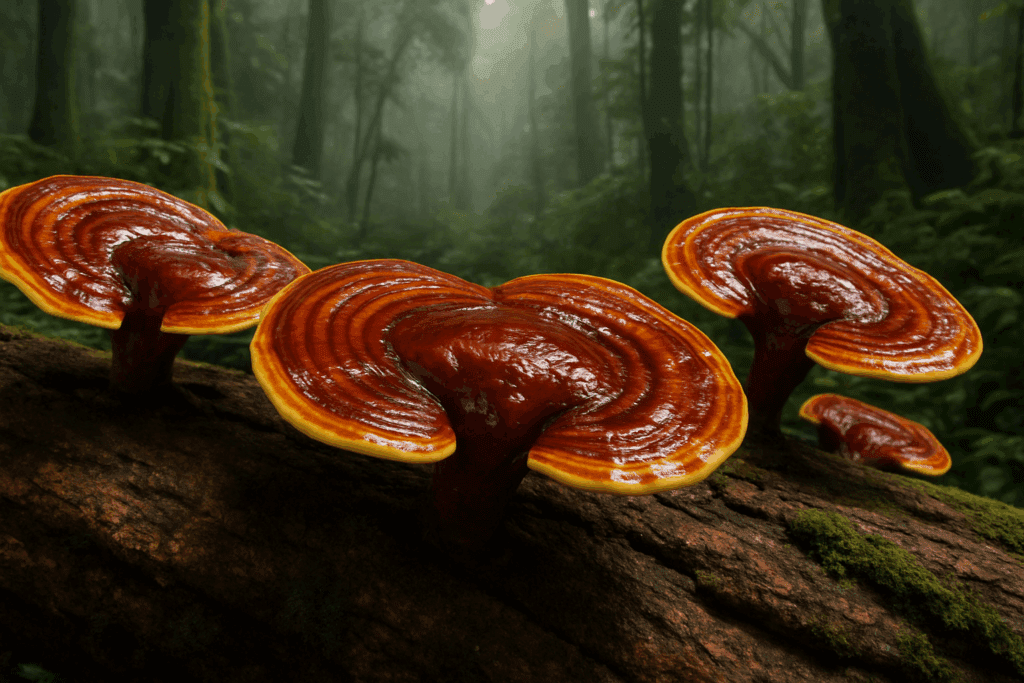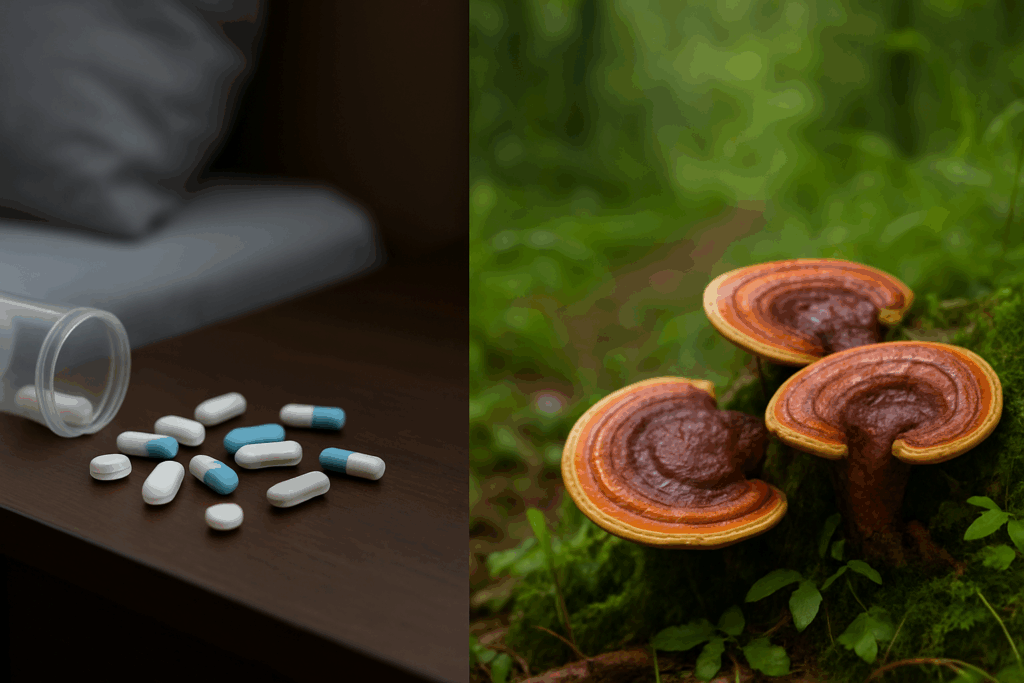Reishi mushrooms, also known as Ganoderma lucidum, have been treasured in traditional Eastern medicine for centuries for their powerful adaptogenic properties. In recent years, modern science has begun to validate these ancient claims, especially in the areas of sleep enhancement and stress reduction. Among the myriad ways people are turning to natural health interventions, understanding the optimal reishi mushroom dosage for sleep has become a particularly important area of focus. With an increasing number of people struggling with sleep quality and chronic stress, reishi offers a promising, evidence-backed alternative that aligns with both tradition and science.
You may also like: The Essential Guide to Reishi Mushroom Benefits: How to Use Reishi Mushroom Powder for Stress Relief and Adaptogenic Support

Understanding the Roots: What Is Reishi Mushroom?
Reishi mushroom is a woody, bitter-tasting fungus that grows on decaying hardwood trees, primarily in Asia but now cultivated worldwide. Its Latin name, Ganoderma lucidum, refers to its shiny, varnished appearance and its dense, fibrous texture. Reishi is often called the “mushroom of immortality,” a title earned through centuries of reverence in Traditional Chinese Medicine (TCM), where it was historically reserved for emperors and the elite. In modern times, the mushroom has garnered attention for its adaptogenic effects, meaning it helps the body adapt to physical, psychological, and environmental stressors.
Unlike culinary mushrooms, reishi is not typically eaten whole due to its tough texture and bitter flavor. Instead, it is consumed in extracts, teas, capsules, and powders. These formulations preserve its bioactive compounds, particularly triterpenoids, polysaccharides, and peptidoglycans, which contribute to its therapeutic potential. These compounds interact with various physiological systems, including the nervous system, immune system, and endocrine system, making reishi a valuable tool for promoting homeostasis and improving overall health.

Adaptogens and the Body’s Stress Response
Adaptogens like reishi mushroom work by modulating the hypothalamic-pituitary-adrenal (HPA) axis, the central stress response system. When the body encounters stress, the HPA axis activates, leading to the release of cortisol and other stress hormones. Chronic activation of this pathway can result in fatigue, sleep disturbances, immune suppression, and metabolic dysfunction. Reishi helps regulate this response by reducing cortisol levels and supporting adrenal balance.
Additionally, adaptogens are believed to enhance the body’s resistance to stress by normalizing physiological functions. Reishi’s adaptogenic properties have been linked to improved sleep patterns, enhanced mood stability, and reduced symptoms of anxiety. This multifaceted approach makes reishi particularly effective for individuals dealing with both acute and chronic stress.

Reishi Mushroom and Sleep Architecture
Sleep architecture refers to the structured progression of sleep stages throughout the night. High-quality sleep involves a smooth transition through stages of light sleep, deep sleep, and REM sleep. Disruptions in this cycle can lead to daytime fatigue, impaired cognitive performance, and emotional instability. Research has shown that reishi mushroom positively influences sleep architecture by promoting longer durations of non-REM deep sleep, the most restorative phase of the sleep cycle.
One of the mechanisms through which reishi enhances sleep quality is by modulating neurotransmitters such as gamma-aminobutyric acid (GABA), a key inhibitory neurotransmitter that calms neural activity. By increasing GABAergic activity, reishi helps reduce sleep latency (the time it takes to fall asleep) and supports uninterrupted sleep. Moreover, reishi’s anti-inflammatory and immune-modulating effects further contribute to better sleep, as inflammation and immune dysregulation are known disruptors of sleep patterns.
Determining the Optimal Reishi Mushroom Dosage for Sleep
Finding the right reishi mushroom dosage for sleep requires careful consideration of individual factors, including age, body weight, health status, and the form of reishi being used. For most adults, clinical and anecdotal evidence suggests that a daily dosage of 1.5 to 5 grams of dried reishi mushroom, or its equivalent in extract form, is effective for improving sleep quality. When using concentrated extracts, lower dosages may suffice due to their higher potency.
Standardized extracts are often measured in terms of their triterpenoid or polysaccharide content, which should be taken into account when calculating dosage. For example, a 10:1 extract means that 1 gram of extract is equivalent to 10 grams of raw mushroom. Thus, a 500 mg capsule of a 10:1 extract may provide similar benefits to 5 grams of dried reishi. Consulting a healthcare provider or integrative medicine practitioner can be invaluable in determining the most effective and safe dosage for your specific needs.

Timing Matters: Best Time to Take Reishi for Sleep
The best time to take reishi is typically in the evening, about one to two hours before bedtime. This allows its calming and sedative effects to align with the body’s natural circadian rhythm. Taking reishi on an empty stomach may enhance absorption, although this can vary depending on individual digestive sensitivities. For those with sensitive stomachs, taking it with a small snack may be more comfortable.
It is important to maintain consistency when using reishi for sleep. Adaptogens tend to have cumulative effects, meaning that their benefits become more pronounced over time. Incorporating reishi into a nightly routine can help signal the body that it is time to wind down, further reinforcing healthy sleep habits. While some users report immediate improvements, others may require several days or weeks of consistent use to notice significant changes in sleep patterns.
Reishi Mushroom Benefits for Sleep: The Science and the Stories
Beyond anecdotal reports, a growing body of scientific literature supports the use of reishi mushroom for sleep enhancement. Animal studies have demonstrated that reishi extracts can increase total sleep time and improve sleep continuity. Human studies, although limited, have shown promising results, particularly among individuals with insomnia or anxiety-related sleep disturbances.
In one study, participants who consumed reishi extract for eight weeks reported significant improvements in sleep quality, reduced sleep latency, and fewer nighttime awakenings. These effects were attributed to reishi’s influence on neurotransmitter regulation and its ability to modulate the body’s stress response. The findings support the broader narrative that reishi mushroom benefits sleep by addressing the root causes of sleep disruption, rather than merely masking symptoms.
Does Reishi Help You Sleep When Dealing With Chronic Stress?
Chronic stress is one of the most pervasive causes of poor sleep quality. It disrupts the balance of stress hormones, impairs melatonin production, and increases inflammation—all of which interfere with restful sleep. This is where reishi’s dual action as an adaptogen and a mild sedative becomes particularly valuable. By regulating cortisol levels and supporting parasympathetic nervous system activity, reishi creates an internal environment conducive to relaxation and sleep.
Moreover, reishi’s influence extends to emotional regulation. Individuals with high stress often experience racing thoughts, anxiety, and emotional reactivity at night, which can delay the onset of sleep. Reishi’s ability to promote emotional balance and mental clarity helps mitigate these obstacles, making it easier to transition into a state of restfulness. This comprehensive approach positions reishi as an ideal supplement for those navigating high-pressure lifestyles or managing long-term stress conditions.

How Reishi Mushroom Sleep Effects Compare to Conventional Sleep Aids
Conventional sleep aids, such as benzodiazepines and over-the-counter antihistamines, often produce immediate results but can come with a host of side effects, including grogginess, dependency, and impaired cognitive function. In contrast, reishi offers a gentler, more holistic approach. Its effects may be subtler at first, but they work in harmony with the body’s natural systems and are less likely to produce adverse effects.
Importantly, reishi does not cause dependence or tolerance, which are common issues with pharmaceutical sleep aids. Users can benefit from long-term use without the need to increase dosage or fear withdrawal symptoms. This makes reishi a sustainable option for those seeking ongoing support for sleep and stress management. The contrast between synthetic sedatives and natural adaptogens highlights the importance of evaluating not just efficacy, but also long-term health implications.
Integrating Reishi Into a Holistic Sleep Routine
While the appropriate reishi mushroom dosage for sleep is a critical factor, it is most effective when combined with other healthy sleep practices. Creating a sleep-friendly environment—dark, cool, and quiet—can enhance the mushroom’s benefits. Likewise, establishing consistent sleep and wake times reinforces circadian rhythms and improves overall sleep quality.
Mind-body practices such as meditation, gentle yoga, and breathwork can further complement reishi’s calming effects. These practices activate the parasympathetic nervous system, encouraging relaxation and mental clarity. When used in conjunction with reishi, they create a synergistic effect that deepens rest and promotes resilience against stress. This integrative approach embodies the philosophy of holistic wellness, where lifestyle, mindset, and supplementation converge.
Safety, Side Effects, and Contraindications
Although reishi is generally considered safe for most individuals, it is important to be aware of potential side effects and interactions. Some users report mild digestive upset, dizziness, or dry mouth, particularly when beginning supplementation or taking high doses. These symptoms are usually transient and resolve with continued use or dosage adjustments.
People with bleeding disorders or those taking anticoagulant medications should exercise caution, as reishi may have blood-thinning properties. Likewise, individuals undergoing immunosuppressive therapy or organ transplants should consult a healthcare provider before using reishi due to its immune-modulating effects. Pregnant and breastfeeding women are advised to avoid reishi unless specifically recommended by a qualified professional.
How to Choose the Right Reishi Product for Sleep Support
The quality and formulation of reishi supplements can significantly influence their efficacy. Look for products that specify the species (Ganoderma lucidum), provide details on extraction methods, and include standardized levels of active compounds such as polysaccharides or triterpenoids. Dual-extraction methods, which utilize both water and alcohol, tend to yield a broader spectrum of beneficial compounds.
Third-party testing for contaminants such as heavy metals, pesticides, and microbial impurities is another marker of product integrity. Reputable brands will provide certificates of analysis and transparency about sourcing and manufacturing practices. Additionally, consider whether the product is organic, as mushrooms are known to absorb environmental toxins from their growing medium.
Reishi Sleep: Building a Sustainable Habit
Developing a sustainable reishi regimen involves more than just taking a capsule at bedtime. It requires intention, consistency, and integration with broader lifestyle choices. Begin with a moderate dose and gradually adjust based on your body’s response. Journaling your sleep patterns, energy levels, and mood can help track progress and fine-tune your approach.
Combining reishi with other adaptogens or calming herbs—such as ashwagandha, holy basil, or lemon balm—may enhance its effects. However, always introduce new supplements gradually and monitor for potential interactions. The goal is not to rely on a single solution but to create a multi-dimensional framework for wellness that includes nutrition, movement, emotional well-being, and restorative sleep.
Frequently Asked Questions About Reishi Mushroom Sleep Support
How Does Reishi Mushroom Dosage for Sleep Affect Long-Term Sleep Quality?
Finding the right reishi mushroom dosage for sleep can contribute to profound improvements in long-term sleep quality by gradually optimizing the body’s internal stress and hormonal balance. Unlike fast-acting pharmaceutical interventions, reishi works cumulatively, meaning that its positive effects on sleep architecture deepen over weeks and months. Many users find that with regular use, reishi promotes more consistent deep sleep cycles, leading to greater daytime alertness and emotional resilience. Over time, this holistic support for sleep not only helps break patterns of chronic insomnia but also nurtures a stronger, more adaptive stress response system. However, individuals should remain patient, as the full spectrum of benefits may take a few weeks of consistent, mindful use to emerge fully.
What Is the Best Time to Take Reishi for Optimal Sleep Benefits?
The best time to take reishi is typically between 7 p.m. and 9 p.m., aligning its natural calming properties with the body’s winding-down phase before sleep. Taking reishi during this window allows its adaptogenic and sedative effects to work synergistically with the body’s natural melatonin release, enhancing sleep onset and depth. Some individuals may also benefit from dividing their reishi intake, consuming a small dose in the late afternoon to manage evening cortisol spikes, followed by a larger dose closer to bedtime. Experimenting within this range can help personalize the best time to take reishi based on unique sleep rhythms and stress levels. Importantly, building a regular pre-sleep ritual that includes reishi can amplify its effects through the power of habit and conditioning.
Can Reishi Mushroom Sleep Benefits Be Enhanced with Other Natural Compounds?
Yes, the reishi mushroom benefits sleep when paired thoughtfully with other natural sleep-promoting agents like magnesium, glycine, or melatonin. For instance, magnesium glycinate complements reishi by supporting muscle relaxation and nervous system calming, making it easier to transition into sleep. Glycine, an amino acid that lowers body temperature slightly, can enhance deep sleep phases when taken alongside reishi. Melatonin supplements, when used sparingly, may also act synergistically with reishi’s influence on circadian rhythms, particularly in individuals dealing with travel-related jet lag or shift work challenges. However, it is important to integrate these combinations under the guidance of a healthcare professional to ensure balanced and effective supplementation.
Does Reishi Help You Sleep Better During Times of Acute Stress or Life Transitions?
Absolutely, reishi is uniquely positioned to support individuals facing acute stressors such as major life changes, grief, or periods of intense workload. By moderating cortisol responses and stabilizing emotional reactivity, reishi helps create an internal environment more conducive to restful sleep, even when external circumstances are turbulent. Its ability to encourage mental clarity and emotional processing during the day further enhances nighttime relaxation. This dual action\u2014supporting both daytime resilience and nighttime rest\u2014is particularly valuable during periods when stress typically disrupts sleep cycles. Incorporating reishi proactively during anticipated stressful events can act as a preventive measure to protect sleep quality and emotional well-being.
Why Is Reishi Mushroom Dosage for Sleep Different From Dosages for Other Benefits?
The reishi mushroom dosage for sleep is often slightly higher than the dosage used solely for immune support or general vitality enhancement because deeper physiological shifts are needed to influence sleep architecture. Promoting sustained GABAergic activity, modulating cortisol, and soothing the autonomic nervous system all require a robust level of bioactive compounds. As a result, sleep-supporting dosages typically range from 2 to 5 grams of raw mushroom equivalent per day, or the extract-based equivalent. Lower doses may still offer calming effects, but users seeking meaningful improvements in sleep quality usually benefit from higher, sustained intake over several weeks. It’s important to tailor dosage carefully, especially when combining reishi with other adaptogens or medications.
How Can Reishi Sleep Benefits Vary Among Individuals?
The reishi sleep experience can vary based on individual factors such as age, hormonal status, stress levels, gut health, and even genetic variations in neurotransmitter sensitivity. For example, individuals with elevated evening cortisol levels may notice quicker improvements in falling asleep with reishi supplementation. Those with serotonin deficiencies might experience mood improvements before noticing sleep-related changes. Gut health can also play a role, as a healthy microbiome enhances the absorption and metabolism of reishi\u2019s bioactive compounds. Recognizing that the reishi mushroom benefits sleep differently depending on these biological and lifestyle factors allows for a more compassionate and patient approach to supplementation.
Is There an Ideal Form of Reishi to Maximize Reishi Mushroom Sleep Benefits?
Choosing the right form of reishi can significantly enhance reishi mushroom sleep benefits. Dual-extracted reishi products, which capture both water-soluble polysaccharides and alcohol-soluble triterpenoids, offer the broadest range of sleep-enhancing compounds. Capsules provide convenience and dosage consistency, while powders allow for more personalized dosing and can be blended into evening teas or smoothies. Some users prefer traditional reishi tea brewed from sliced mushroom pieces, appreciating the ritualistic, meditative aspect of preparation. Whichever form is chosen, ensuring that the product is organic, third-party tested, and contains standardized active compounds is key to achieving optimal results.
What Role Does Lifestyle Play in Enhancing Reishi Sleep Outcomes?
While the appropriate reishi mushroom dosage for sleep is critical, lifestyle factors dramatically influence outcomes. Exposure to natural light during the day, especially in the morning, reinforces circadian rhythms and complements reishi\u2019s nighttime effects. Reducing blue light exposure in the evening by dimming lights and limiting screen time helps prevent melatonin suppression, allowing reishi to work more effectively. Mindfulness practices, such as journaling or gentle stretching before bed, further prime the body for deep, restorative sleep. Additionally, managing dietary factors like limiting caffeine intake after noon and focusing on blood sugar stability can amplify the calming influence of reishi. Thus, reishi is most powerful when used as part of a comprehensive sleep hygiene strategy.
How Does the Concept of the Best Time to Take Reishi Shift With Age?
Interestingly, the best time to take reishi may shift subtly as people age due to changes in circadian biology and hormonal patterns. Younger adults with delayed sleep phase syndromes might find that taking reishi slightly earlier in the evening, around 7 p.m., better supports earlier sleep onset. Older adults, who often experience advanced sleep phase tendencies, might benefit from taking reishi closer to 8:30 p.m. to counteract early evening drowsiness and promote sustained nighttime rest. Hormonal fluctuations such as reduced melatonin production in older adults can also make them more sensitive to the timing and dosage of reishi supplementation. Customizing reishi intake timing to reflect these natural shifts can optimize sleep outcomes across the lifespan.
Could Long-Term Use of Reishi Mushroom Sleep Supplements Impact Cognitive Health?
Emerging research suggests that the long-term use of reishi mushroom sleep supplements may offer cognitive benefits beyond improved sleep. Chronic sleep deprivation is a known risk factor for cognitive decline, and by promoting deep, restorative sleep, reishi indirectly supports memory consolidation, emotional regulation, and neuroplasticity. Furthermore, reishi\u2019s anti-inflammatory and antioxidant properties may provide direct neuroprotective effects, safeguarding brain health over time. Some animal studies even hint at reishi’s potential to support the growth of new neural connections, although more human research is needed. Thus, integrating reishi thoughtfully into a long-term wellness routine not only addresses immediate sleep challenges but could also contribute to maintaining cognitive vitality well into older age.”
Conclusion: Reclaiming Rest Through the Right Reishi Mushroom Dosage for Sleep
In an era defined by overstimulation and chronic stress, the simple act of getting a good night’s sleep has become elusive for many. Yet, as the science continues to affirm what traditional medicine has long known, reishi mushrooms offer a compelling solution rooted in nature and validated by research. Understanding the proper reishi mushroom dosage for sleep is not merely about numbers on a supplement label—it’s about fostering a relationship with your body’s rhythms and supporting them with care and consistency.
When integrated thoughtfully into a broader wellness routine, reishi has the power to transform restless nights into restful ones and reactive days into resilient ones. Whether you’re navigating sleeplessness due to stress, adjusting to shift work, or simply looking to optimize your nightly rest, reishi provides a gentle yet profound ally in your journey. By honoring both the ancient wisdom and the modern insights surrounding reishi, you can create a foundation for enduring sleep health and emotional balance—naturally, safely, and sustainably.
Further Reading:
Improve Your Sleep with Reishi Mushrooms
6 Benefits of Reishi Mushroom (Plus Side Effects and Dosage)
